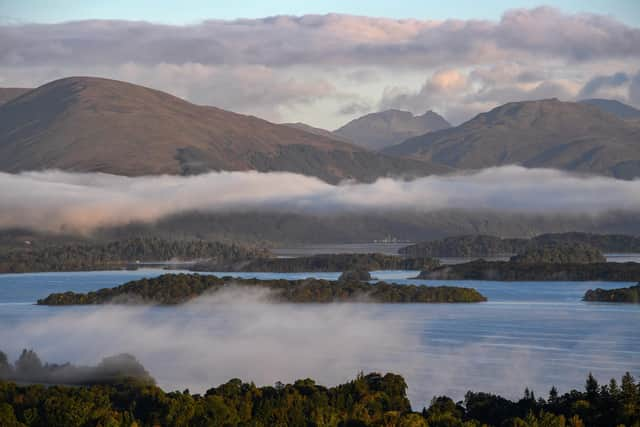Biodiversity crisis: Scotland can lead the world on rewilding and restoring nature to good health – Jeremy Leggett
A particularly worrying example of this biodiversity collapse is the number of insects splattered on our car windows. Older readers will remember many more than today. This is deadly serious. If we lose our pollinators, we lose the ability to feed all but the super-rich.
But recovery is possible, if enough land managers change their practices. Some Scottish estates are beginning to show how. Perhaps the best exemplar of nature springing back to flourishing life, however, is well south of the Border: the Knepp estate in Sussex.
Advertisement
Hide AdAdvertisement
Hide AdThe Scottish Government does not intend to let the English lead in the imperative of nature recovery. They aim to stop biodiversity decline by 2030.
Achieving that would entail both a complete system change in land management on most Scottish land, and investment of some £20 billion to drive it, according to the Green Finance Institute.
Pragmatists view this as an impossibly short timeframe. I think they are wrong.
I base my case on analogous experience. In the field of energy, the spectacular global growth of solar since 2006 saw an expensive and marginal electricity generator grow into the least expensive and most installed form of energy production in the world. This is system change in full flow. The exponential growth rate in solar deployment has confounded many an energy pundit.
I was fortunate enough to ride this wave. The solar energy company I founded, Solarcentury, doubled its installed capacity 11 times between 2000 and 2019. In that time the global installed capacity doubled eight times. When Solarcentury was bought by Norwegian renewables giant Statkraft in 2020, it had more than 1,000 alumni around the world.


My colleagues and I saw the way capital flowed into the growing industry from the front lines. First came the angel investors – affluent individuals and foundations who both understood the business potential and appreciated the environmental imperatives for solar and other sources of clean energy to replace coal, gas and oil.
The financial institutions came later, after they had overcome their innate conservatism and felt able to deem solar “investable”. Government incentives – especially in Japan, Germany, the USA and China – stoked the growth and were then phased out as the cost of solar plunged.
This history shows how capital ultimately measurable in billions can flow into the currently embryonic nature-recovery industry, to the advantage of economies that position early to benefit.
Advertisement
Hide AdAdvertisement
Hide AdThe money will come from pension funds, insurance companies, the investment arms of banks, and other such investment funds. These institutions together hold multiple trillions of pounds looking for a sensible home, as things stand today.
This time we must move faster, and learn the lessons from lost time in mainstreaming solar and other renewable energies. The environmental crisis in biodiversity collapse and climate meltdown is just too clear and present a danger. Financial institutions should no longer be saying investment on a new business frontier is "too risky”. Their biggest risk, unless they act, is that they won’t have a liveable world to make investments in, 20 or even ten years from now.
After Solarcentury was sold, I set up a new company that aims to help trigger explosive growth in the embryonic nature-recovery industry in Scotland. Highlands Rewilding began life in 2020 mainly thanks to angel investors. There were 55 of them by 2022. Only one was a financial institution putting a toe in the water.
In our upcoming second round of investment, from which we hope to emerge able to help take nature-recovery to scale in Scotland, we will be inviting other institutions, alongside more individuals, to join the mission.
To me, the parallels with the early years of the solar revolution are striking, especially in the processes of advocating disruptive system change and attracting capital to the task.
But there are two big differences. With solar in England, the pioneer advocates faced an entrenched energy incumbency often willing to fight dirty (they still do), and an unhelpful government who sided more with the incumbents than the disruptors (they still do).
With nature recovery in Scotland today, Highlands Rewilding faces an incumbency generally willing to entertain change, and often leading the way in pioneering it. And we have a government that is serious in its advocacy of the necessary collective pivot in land management.
In my two years in Scotland, I have talked to enough senior civil servants and politicians to convince myself that I live in a nation capable of a leading role in the international fight for nature recovery. I have also seen first-hand the breadth of talent willing to be mobilised across the business world and in Scottish universities and research institutions.
Advertisement
Hide AdAdvertisement
Hide AdKey tests have yet to be passed. The most important will be the crafting of a workable economic reward system for measurable, verifiable, increases in biodiversity added and carbon sequestered. Only in this way can nature-recovery companies be profitable, and land-owners remunerated adequately for the changes they make.
I have met many a civil servant and expert working hard on this behind closed doors. And I know companies preparing to finance the rewards, whether they are required to do so by future law or not.
Another test involves effective marriages between food production and nature recovery. Many experts know they can be twinned, and we have to convince a critical mass of traditionalists about this.
Passing these and other tests, and mobilising combined resources under effective leadership, a nation of five million can lead the world in nature recovery.
If it does so, it will surely encourage others to follow.
Dr Jeremy Leggett is founder of Highlands Rewilding and an entrepreneur-in-residence at Scotland’s Rural College
Comments
Want to join the conversation? Please or to comment on this article.
